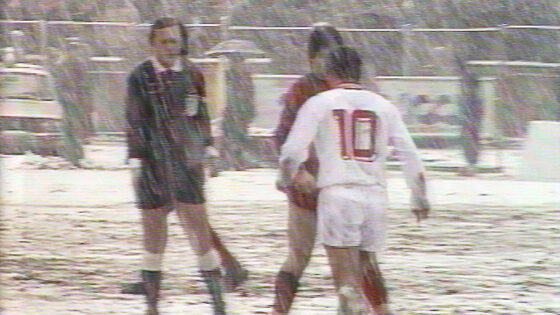Best of the Decade: Corneliu Porumboiu

By Antoine Bourges
There is a scene early in Corneliu Porumboiu’s When Evening Falls on Bucharest or Metabolism (2013) in which the main character, a film director named Paul, sits in his bare kitchen, smoking a cigarette, caught in his thoughts. He seems slightly bothered, although like most Porumboiu leads his facial expression remains largely inscrutable throughout the film, only occasionally varying between neutral and mildly annoyed. After a moment, he takes a fork and presses it against his stomach, bending it to the point that he emits a muffled groan. He then picks up his phone and calls his producer to tell her that his condition has worsened: he fears his ulcer has returned, and she may have to delay the shoot (“It feels like a knife in the stomach”). Beyond the character’s deception to create a more realistic performance of ill health, I feel like there is something deeper in Paul’s act of mini-masochism—an invitation to us from Porumboiu to further explore what may really be wrong with his protagonist. Towards the end of the film, Paul shows medical imaging of his stomach to his producer—who has been suspicious of his alleged health condition all along—and the doctor she has brought with her. What follows is full-screen footage of an endoscopy, at the end of which the doctor identifies gastritis, but no trace of ulcer, although he can’t prove that there wasn’t one before. What does it mean? We’re not sure, especially since, like Paul’s producer, we suspect the video is a fake.
It is this often-misguided search for a final, verifiable truth—often made visible by the use of such material proofs as documents, scientific images, sketches on white boards—that has always fascinated me about Porumboiu’s cinema. I was particularly struck by The Second Game (2014), which consists entirely of a “factual” image: the original telecast of a snowy 1988 soccer game between Romania’s two top teams (one affiliated with the army, the other with the police). The visuals are accompanied by audio commentary between Porumboiu and his father, who was the game’s original referee and, at the time, had been receiving death threats. Equipped with this information, and the hindsight of Ceaușescu’s execution a year later, we are left searching the images onscreen for some sign of the impending revolution—only to find nothing more than an above-average soccer match, occasionally abstracted by the gusts of snow that regularly blow across the screen.
In Porumboiu’s films, I see a connection to the use of “factual” elements in my own work. I often work with non-actors and have used re-enactments of what may seem like insignificant administrative protocols in a few of my films. In one particular instance, while interviewing a caseworker for a film project in Toronto, I came upon a type of document I had not seen before: a court referral for a man who was charged for refusing to appear in court after being caught stealing. While I found this form itself interesting—the surplus of handwritten notes sticking out of every box, the most pertinent text scribbled in the margins—the content said very little: it presented a vague series of small charges, an undiagnosed medical condition, but of course no hint as to what may have drawn this man to these actions, let alone why he continually refused to appear in court. Still, I was caught by the document and made a copy, in which I redacted all information that could identify this person. Eventually, I wrote a fiction loosely based on the information in this referral, which became my first feature, Fail to Appear (2017). A slightly altered replica of this form features in the film, presented in a manner visually inspired by the scrolling policeman’s notes in Porumboiu’s Police, Adjective (2009). When I see the form now, I think that it is its “claim of truth”—the illusion of defining this person—and what it failed to explain that drew me to it.
French poet Stéphane Mallarmé described the purpose of poetry as “to show us the nothingness that is the world, to conjure up ‘l’absente de tout bouquet,’ the ideal flower that is absent from all real bouquets.”Beyond their intelligence and wry humour, Porumboiu’s films reveal this absence, and in doing so, allow imaginary narratives to surface. What they are showing cannot be shown.
Antoine Bourges

